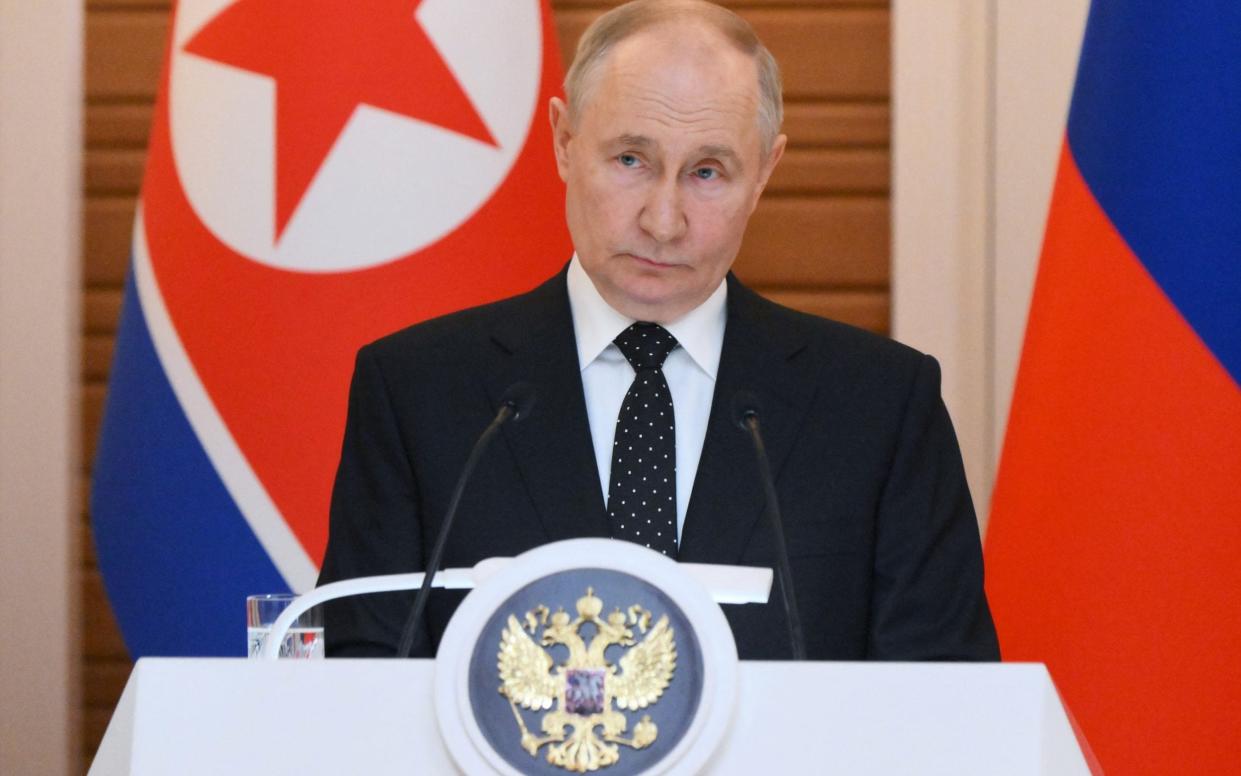Desperation is making Putin even more dangerous

- Oops!Something went wrong.Please try again later.
There is nothing “peaceful” about the defence pact that Vladimir Putin signed yesterday with his North Korean counterpart, Kim Jong-un. On the contrary, the comprehensive strategic partnership agreed between the two leaders during the Russian president’s visit to Pyongyang demonstrates the deepening bond between two rogue states whose main aim is to forge a new “axis of evil” to confront the West.
As Putin explained in a letter that was published by the North Korean media before his visit, forging a pact between Moscow and Pyongyang is key to confronting efforts by the US and its allies to impose a “neocolonialist dictatorship” around the globe.
At the heart of the agreement is a mutual defence deal that requires both countries to come to one another’s aid in the event of them coming under attack. After Kim hailed the signing of the “peaceful and defensive” pact, Putin made clear that it included “the provision of mutual assistance in the event of aggression against one of the parties”.
In what might be called the “poor man’s Nato”, the fact that both these regimes have felt it necessary to rally to each other’s defence is indicative of their fundamental weakness.
The signing ceremony itself had overtones of the Soviet era, when Moscow helped to establish the Kim dynasty in power at the end of the Second World War. The North Koreans did their best to project the importance of their anti-Western agreement, with the carefully choreographed meeting between the two leaders taking place before a massive banner declaring that “North Korean-Russian friendship will be eternal”. For his part, Putin tried to impress Kim by giving him a £250,000 Aurus limousine – known as the “Russian Rolls-Royce”.
But these conspicuous displays of dictatorial consumption cannot disguise the fact that the increasing military co-operation between Moscow and Pyongyang has been forged out of desperation.
For all Putin’s bravado about the progress he claims his forces are making in their military offensive in Ukraine, the stark truth is that the Russians have suffered catastrophic losses – Western intelligence estimates suggest the number of Russian war dead has now passed the 350,000 mark – and are struggling to resupply front-line forces with weapons and men.
If, as Putin would like the world to believe, Russia really has become a military superpower to rival the Western alliance, then Moscow would not be going cap in hand to a tinpot dictator like Kim begging for arms.
The North Koreans are in an even worse state. Pyongyang is in desperate need of food, fuel, cash and high-end weapons technology to help it survive the economic sanctions imposed over its nuclear weapons programme.
Even so, the danger to international security that deeper co-operation between these two nuclear-armed dictatorships poses cannot be underestimated.
The military support provided by North Korea, together with China and Iran, has proved vital to sustaining Putin’s war effort at a time when the Russian military is running short of weapons. Since Kim initiated his closer association with Putin last September, when he travelled in his armoured train to meet the Russian leader at a space-launch base in Russia’s Far East, there has been a dramatic increase in the delivery of North Korean munitions.
US officials report that more than 10,000 shipping containers filled with artillery shells, missiles and other weaponry have been sent to Russia, with at least 10 North Korean-made missiles being launched against Ukrainian targets since September. Pyongyang’s missile systems are based on Soviet-era designs – as are Iran’s – which means they can be easily adapted for Russian firing systems.
What Kim gets in return for providing military support for Putin is more opaque, although the North Koreans make no secret of their desire to advance their space, missile and nuclear programmes.
It is surely no coincidence that, not long after Kim’s return from last September’s meeting with Putin at Russia’s Vostochny Cosmodrome spaceport, the North Koreans finally managed to launch their first military reconnaissance satellite, the “Malligyong-1”, after two previous failed attempts. Having access to such satellites enhances North Korea’s ability to target opposition forces more accurately with its missiles.
Pyongyang is also seeking access to Russian expertise in other areas, such as advanced weaponry, nuclear enrichment and atomic propulsion for submarines.
It is a moot point how much technological co-operation Putin is prepared to accept with Pyongyang, especially if it risks alienating another key ally of the Kremlin, China. Because the other consideration Western leaders need to take on board is that the new North Korean-Russian defence pact should not be viewed in isolation. Both countries are also closely aligned with Iran and China, two autocratic regimes that are similarly committed to undermining the Western alliance. And the closer they work together, the more of a risk they will pose to our future security.

